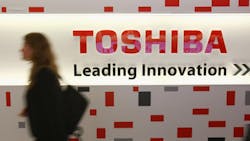TECH ROUNDUP: Toshiba Dives to 35-Year Low
TOKYO — Toshiba shares dived to a more-than-35-year low Friday after the scandal-hit firm widened its annual loss forecast to a whopping $6 billion, while a strong yen dragged the Nikkei into the red.
The company’s gaping shortfall was announced after markets closed Thursday and the firm’s stock plummeted nearly 14% to 171 yen ($1.46) by the break Friday, its lowest close since late 1979.
One of Japan’s best-known firms, Toshiba has taken huge charges in the wake of an embarrassing profit-padding scandal, and it also blamed the global economic slowdown for weak sales.
Bucking the downtrend, Sharp soared 8.75% to 174 yen ($1.49) as Japan’s Kyodo News said the embattled firm could announce Friday it has agreed to a bailout from Foxconn parent company Hon Hai Precision.
Sharp Surges on Reports of Likely Deal With Foxconn Parent
TOKYO — Sharp skyrocketed with the hard-hit Japanese electronics giant saying it was mulling rival bailout offers, including one from Foxconn parent company Hon Hai Precision, as it posted another massive loss.
Tokyo investors cheered local media reports that Sharp’s board is favoring a 600 billion yen ($5.13 billion) rescue from Hon Hai, a key Apple supplier.
Sharp, which has teetered on the edge of bankruptcy for years, kicked off a critical directors’ meeting Thursday morning to review at least two competing bids, including a proposal from a domestic investment firm.
Japanese media, including public broadcaster NHK and the Jiji Press news agency, said Sharp’s board was leaning towards the 300 billion yen ($2.56 billion) offer from Hon Hai, which is based in Taiwan.
Panasonic Cuts Sales Target on Slowdown in China, Emerging Economies
TOKYO — Panasonic cut its full-year revenue forecast, citing a slowdown in China and other emerging economies, but added that net profit soared in the nine months to December.
The Japanese electronics giant — which has been undergoing a huge restructuring to close the door on record losses in recent years — trimmed its fiscal year sales target by nearly 6% to 7.55 trillion yen ($64.51 billion).
“The business environment has worsened due to (an) economic slowdown in emerging countries including China,” the company said in a statement.
Panasonic’s move to trim its full-year sales forecast came on the back of lackluster sales in Japan of rechargeable computer batteries and housing-related products, including solar power systems. But it added that its fiscal year to March net profit would still come in at 180 billion yen ($1.54 billion).
Taiwan Approves TSMC Plans for $3 Billion Plant in China
TAIPEI, Taiwan — Taiwan approved a plan by its leading chipmaker to build a $3 billion plant in China using state-of-the-art technology, after easing curbs on high-tech investment in the mainland.
Taiwan Semiconductor Manufacturing Company (TSMC), which in revenue terms is the world’s top microchip maker providing tailor-made services, plans to build the wholly-owned plant in the eastern city of Nanjing.
The Investment Commission announced its approval in a statement after a screening meeting.
Taiwan previously controlled such hi-tech investment on fears the island could lose its competitive edge to China, which still regards Taiwan as part of its territory awaiting reunification — by force if necessary. It started easing the curbs five years ago as overall relations improved.
Lenovo Posts First Revenue Fall in 6 Years
HONG KONG — Chinese tech giant Lenovo posted its first revenue decline for six years due to slowing growth in the smartphone market and falling PC sales, sending its shares plummeting.
Lenovo said revenue for the October-December quarter declined 8% year-on-year to $12.9 billion. Its shares had fallen 10.19% at the close in Hong Kong, while the overall Hang Seng Index dropped 2.34%.
“The biggest problem is that their handsets are still not a profitable business,” said financial analyst Francis Lun, referring to Lenovo’s multi-billion dollar purchase of Motorola. “Lenovo planned to turn around Motorola within one or two years but so far it hasn’t happened and I think the handset business is too competitive.”
Revenue for the company’s PC business was down 12% for the quarter and revenue for its mobile sector was down 4% compared to the same period in 2014. But the firm posted a surprise gain in net profit for the third quarter.
Copyright Agence France-Presse, 2016
About the Author
Agence France-Presse
Copyright Agence France-Presse, 2002-2025. AFP text, photos, graphics and logos shall not be reproduced, published, broadcast, rewritten for broadcast or publication or redistributed directly or indirectly in any medium. AFP shall not be held liable for any delays, inaccuracies, errors or omissions in any AFP content, or for any actions taken in consequence.
